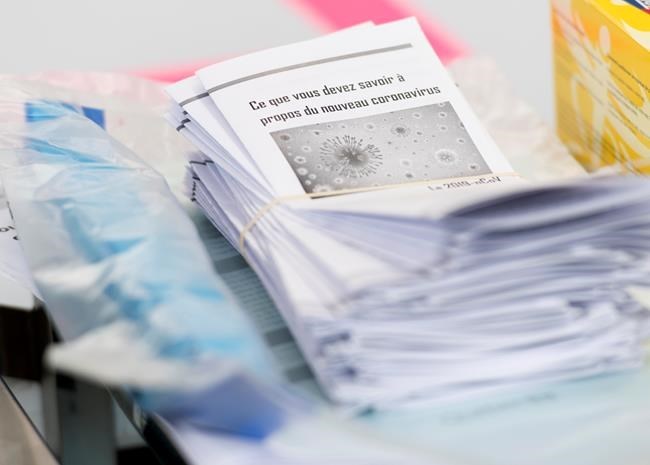
Information on the Coronavirus is shown at a drive-thru COVID-19 test clinic in Montreal, Sunday, March 29, 2020, as Coronavirus COVID-19 cases rise in Canada and around the world. THE CANADIAN PRESS/Graham Hughes
March 30, 2020 - 1:00 AM
Thousands of scientists around the world are working on problems raised by the COVID-19 pandemic, including the search for a vaccine against the virus. Canadian researchers are part of that search. Here is a summary of some of the projects underway at Canadian universities:
---
Western University in London, Ont., is working on a COVID-19 vaccine, as well as on developing a coronavirus vaccine bank containing hundreds to thousands of potential vaccines that could be used at the start of another outbreak.
The research builds on previous work done at the school for a vaccine against the MERS virus, another coronavirus related to the one now circulating.
Researchers hope to develop ways to adapt vaccines effective against one virus to work against a related one. That would allow them to quickly produce new vaccines to fight future viral outbreaks.
---
In Saskatoon, University of Saskatchewan scientists are trying to identify what common lab and agricultural animals can be infected with the virus to better understand which animals may pose a risk and which may be used as models for human infection.
The team will also use animals to ensure proposed vaccines don't actually worsen the infection, as has been observed elsewhere, and to determine whether animals can be used to test safety of vaccines.
The university's Vaccine and Infectious Disease Organization is building a pilot-scale plant on campus for vaccine development. It says it's the first in the country to have a possible novel coronavirus vaccine for testing in animals.
---
The University of Alberta in Edmonton is also investigating possible coronavirus vaccine candidates.
Researchers are building on previous experience to work toward developing methods for industry-scale vaccine purification.
---
A University of Alberta cancer researcher and his biotechnology company is working on a DNA vaccine for the COVID-19 virus.
DNA-based vaccines introduce genetic material into a patient’s cells, which causes them to make bits of the virus and trick the immune system into a response. Such a vaccine is easier to manufacture at scale, offers improved stability and doesn't need an infectious agent.
The vaccine candidates are to be tested soon in animal models before moving to human trials.
---
At Laval University in Quebec City, scientists who have already had success against the Zika and MERS viruses are trying to develop a COVID-19 vaccine by reverse-engineering the genetics of the novel coronavirus.
Data is to be used to identify bodies that can neutralize the virus. The research, conducted in conjunction with biotechnology companies, is also expected to yield information on vaccine safety as well as on how the target viruses damage and travel between their human hosts.
---
Laval is also host to a project hoping to use nanoparticles to enhance the strength of an immune response and the speed of that response for any new vaccine.
The project is also looking for ways to induce cells to produce antibodies against the virus. The two components would be combined into a vaccine.
The approach has been used before during the SARS epidemic in 2002 and produces stable vaccines that can be stored for long periods.
---
In Winnipeg, a University of Manitoba team is looking at how the novel coronavirus gains entry to a healthy cell.
Researchers suspect compounds that interfere with that mechanism could be used as vaccines. They've found a way to target cells that present antiviral agents to the immune system and hope to use those cells to transmit the compounds they've developed.
---
University of British Columbia scientists are examining the effectiveness of previously known drugs against the novel coronavirus.
Many viruses that affect human health are related, but it's not known if drugs developed to fight those are effective against COVID-19.
The team is assessing the most likely drugs to work and, since it's already known they are safe, putting them into clinical trials. Work has already begun on a drug originally developed to fight HIV.
---
This report by The Canadian Press was first published March 30, 2020
News from © The Canadian Press, 2020